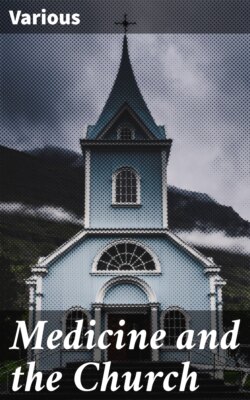Читать книгу Medicine and the Church - Various - Страница 3
На сайте Литреса книга снята с продажи.
FOREWORD
ОглавлениеTable of Contents
BY
THE LORD BISHOP OF WINCHESTER
Farnham Castle, Surrey:
July 4, 1910.
Dear Mr. Geoffrey Rhodes,
The appearance of your volume is very welcome. There is, I believe, a real need for such a work. You are to be congratulated on the results of the energy and patience which you have bestowed upon its preparation. You have a true reward in the support of writers so varied and conspicuous in distinction as those whose names you have been able to bring together.
You are enabling the whole reading world to judge for itself, how the subject of ‘Spiritual,’ ‘Mental,’ or ‘Faith’ healing, which during the past ten years has forced itself upon public notice, is being regarded by able, thoughtful, and impartial minds. There is no doubt that scientific medical men are not going to pay attention to evidence of an unscientific character. They will not waste their time over it. Nevertheless, to phenomena duly attested, and to evidence scientifically recorded, they will give the most scrupulous attention. It is the detailed and accurate collection and classification of facts by those who are trained for the task and expert in its process, that must precede generalisations upon this new, or shall we call it, revived, branch of therapeutics.
Prejudice against it will be found to exist both in ecclesiastic and in scientific circles. Your book will help to dissipate prejudice by the spread of better-informed opinion. The time, indeed, is opportune. The British Medical Journal of June 18, 1910, has published a series of papers by men ‘who could speak with the highest authority on the relations between mind and body, as exhibited in the phenomena of disease.’ ‘Their opinion,’ as the Journal tells us, ‘serves as an authoritative reminder that there are bodily ills which cannot be cured by pills and potions, but which yield to methods which, for want of a better word, may be called “mental”; that cures which, in a former day, would have been denied by unbelievers and accepted as miracles by the faithful, really happen, and that they can be explained without invoking supernatural intervention.’ On the other hand, we are confident the Church of Christ will never identify itself with charlatan methods which might delude the poor and the ignorant into the superstitious idea that they can be more cheaply and effectively healed by a magic or thaumaturgic ministry, than by the knowledge and skill of trained and certificated doctors and surgeons. To quote our report in the Lambeth Conference of 1908, ‘Medical science is the handmaid of God and His Church’ (N.B. not of His clergy, but of that Body of Christ in which all true callings unite in serving), ‘and should be fully recognised as the ordinary means appointed by Almighty God for the care and healing of the human body.’
The temper of our age favours an inquiry conducted in a spirit which will neither disregard the requirements of science, nor rule miracles out of court as impossible. We need not be anxious as to the results. It looks, indeed, as if science were only just now awaking to the realisation of its possibilities through psychical treatment; and as if the Church had never yet realised to the full its responsibility and its power in ministration to sickness, and its influence over the reason and the imagination.
‘Suspect everything,’ says St. Teresa, as quoted by Sir Clifford Allbutt, ‘which weakens the use of our reason; for by such a way, we shall never attain to the liberty of the Spirit.’ ‘Prayer,’ says the British Medical Journal, in the article quoted above, ‘inspired by a living faith, is a force acting within the patient, which places him in the most favourable condition for the stirring of the pool of hope that lies, still and hidden it may be, in the depths of human nature.’ Truly, it is a tribute to the intellectual temper of our day that two such quotations, the one from a medieval saint, the other from a leading article in our modern medical journal, can appropriately be adduced in illustration of the spirit in which you have edited your volume. I trust it will have many readers. That it may promote the wise and temperate study of spiritual and mental, as well as of physical, forces and disorders, is my earnest hope and desire. That it may also tend to correct shallow and superficial delusions on the part of ignorant persons who imagine that they can dispense with scientific knowledge, and ignore the facts of mortality in suffering, disease, and death, is an expectation which I pray may be fulfilled.
Wishing, therefore, your volume all success,
I am, dear Mr. Geoffrey Rhodes,
Yours very sincerely,
Herbert E. Winton.
